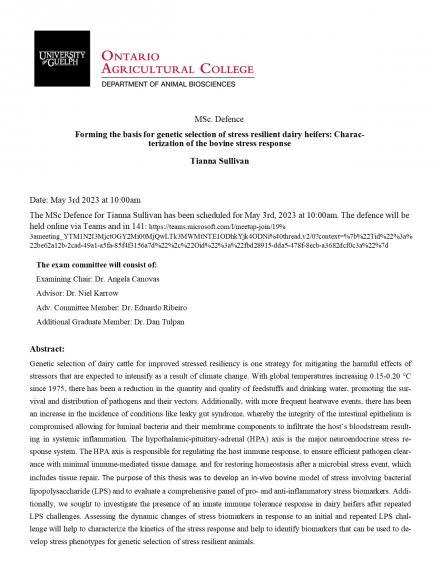Tianna Sullivan's MSc Defence
Date and Time
Location
Room 141 and Teams: https://teams.microsoft.com/l/meetup-join/19%3ameeting_YTM1N2I3MjctOGY2Mi00MjQwLTk3MWMtNTE1ODhkYjk4ODNi%40thread.v2/0?context=%7b%22Tid%22%3a%22be62a12b-2cad-49a1-a5fa-85f4f3156a7d%22%2c%22Oid%22%3a%22fbd28915-dda5-478f-8ecb-a3682dcf0c3a%22%7d

Details
Genetic selection of dairy cattle for improved stressed resiliency is one strategy for mitigating the harmful effects of stressors that are expected to intensify as a result of climate change. With global temperatures increasing 0.15-0.20 °C since 1975, there has been a reduction in the quantity and quality of feedstuffs and drinking water, promoting the survival and distribution of pathogens and their vectors. Additionally, with more frequent heatwave events, there has been an increase in the incidence of conditions like leaky gut syndrome, whereby the integrity of the intestinal epithelium is compromised allowing for luminal bacteria and their membrane components to infiltrate the host’s bloodstream resulting in systemic inflammation. The hypothalamic-pituitary-adrenal (HPA) axis is the major neuroendocrine stress response system. The HPA axis is responsible for regulating the host immune response, to ensure efficient pathogen clearance with minimal immune-mediated tissue damage, and for restoring homeostasis after a microbial stress event, which includes tissue repair. The purpose of this thesis was to develop an in-vivo bovine model of stress involving bacterial lipopolysaccharide (LPS) and to evaluate a comprehensive panel of pro- and anti-inflammatory stress biomarkers. Additionally, we sought to investigate the presence of an innate immune tolerance response in dairy heifers after repeated LPS challenges. Assessing the dynamic changes of stress biomarkers in response to an initial and repeated LPS challenge will help to characterize the kinetics of the stress response and help to identify biomarkers that can be used to develop stress phenotypes for genetic selection of stress resilient animals.